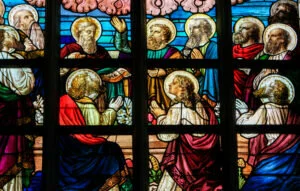The early cantos of Purgatorio feel obsessed with haste and urgency as well as light and shadow, continuing the themes of right desires and purification I identified in the first two cantos.
Stepping Partly in the Light
The pilgrim often notices the sun and its path, and he and the many souls frequently notice and remark upon his shadow—or, in the indirect diction of the poem, “that the light was broken” around him. We should not mistake these moments as “just poetry.” Poets often use ornamental language to praise something deserving more than common description or metaphorical language to allude to something that escapes language altogether. So what does this strange phrasing mean?
At the conclusion of your internship, then you’ll have relevant experience to assist you decide if starting your career in the area of your internship is your best option for you. Managers that keep silent overlook the chance to block the rumor mill. There might be two or three little houses, each with a couple of resident carers, whose essay writing service is to give support where it’s needed. Then whenever you’re on the job, you’ve got deadlines to meet and jobs to finish. There isn’t any reason to be ashamed if you need assistance paying your rent. Also, be certain to look for energy efficient appliances, which usually means you continue to conserve money over time as you use them. Do not forget the store has already paid cash for the product that they will lose whether the product is actually stolen.
To begin with, we can note that the light breaking around him is Purgatory’s corollary to the way his feet sank into the ground in Hell. Everything in Hell spirals downward toward its dark, cold center, so the pilgrim’s footprints remind us of the weight of sin upon the lost souls and its gravitational pull down toward the grave. As in Hell, the breaking light in Purgatory reveals to others that Dante still lives.
But it also keeps us in mind of the presence of light and suggests the two-fold or mixed status of the saved but unpurified soul, both in the light and partially untouched by it. As I was looking for a shadow image for this post, I was struck by how shadows both require a body and to some extent erase it, abstract it to its most basic form, distorts it, even, so that we see it in a new way. Shadows help us notice our bodies. They also help us notice the light.
Haste Makes Waste in the Afterlife, Too
The haste motif follows upon Cato’s chiding the souls to run up the mountain in canto II. Virgil and Dante get going along with the other souls, and Dante focuses on keeping up with Virgil until “his feet had given up the haste / that mars the dignity of any action” (III.10-11).
It is almost an aside, as though he assumes his readers know exactly what he is talking about. And perhaps we do. I certainly know the feeling of rushing somewhere because I am late and imagining the disorganized spectacle I must seem to onlookers.
But why bother saying anything at all? Something about haste’s effect on dignity is important enough to mention, here.
Dante compared the scurrying souls in canto II to scared doves scattering, each “like one who goes without knowing the direction.” Little enough dignity, there. These newly dead souls are as far from God as the saved can be, and it shows in their undignified behavior. At least they can learn.
Dignity as a value belongs somewhat to the discourse of honor, but it also suggests the philosophical discourse of virtue as well as the moral (Christian) discourse of personal dignity. The ancient philosophers tended to answer the question of the good life with a description of a good man, i.e., a man of good character or expressing the virtues or excellencies of a human being. We also saw that sins against the intrinsic dignity of another landed souls in the deepest recesses of Inferno. Dignity, obviously, goes well beyond the mannered pretensions of class and refers, for Dante, to the image of God in each of us and how we bear and present it.
How interesting, though, in our Information-Age impatience with everything, to read a critique of haste in a 750-year-old poem? And yet the alternative to haste is not lassitude or slowness but something more like purposiveness. Not many lines after the haste comment, Virgil himself, asking other souls the way up the mountain, notes that “who knows most grieves most at the loss of time” (III.78). There’s that old suspicion of sloth or idleness, here, and another reminder that we must order our desires rightly. If we know what is the highest good, we should waste no time in pursuing it, but nor should we foolishly hasten as if speed were our purpose, and not love of God.
Thought itself can distract one from purposiveness. In canto V, Dante pauses to consider how the other souls stare at him for casting a shadow, and Virgil has to correct him:
Follow behind me and let the people talk.Stand like a firm tower that never trembles
at the top though the wind blows upon it:for always that man in whom thought wells upover thought puts his goal farther from him
as the one weakens the force of the other.” (V.13-18)
Dante needs no philosophizing to know what he should do, and in fact the problem here is in part egotism. He reports that the souls were “staring in amazement / at me, at me,” and that repetition emphasizes what was top of mind for the pilgrim in that moment. There’s a real appreciation for the deed in ancient thought that an inveterate contemplator such as myself can find inspiring, for all its obvious limitations.
Always Time for Grace
I’ve glossed over the fact that these cantos contain some rather spectacular gore, on a par with some of what we saw in Hell, as those who died violent deaths recount in detail their final moments.
Dante, I think, wants first to impress upon us the correspondence between how the person lived and how he or she died, but he also wants to highlight the breadth of grace such that even the prayer on one’s final breath can deliver one into the care of Christ. There’s even a theatrical scene of a demon complaining that an angel of God claims Buonconte da Montefeltro’s soul which only reinforces the richness of grace:
. . . . . ‘Oh you from heaven, why do you rob me?
You carry off with you the eternal partof this one for one little tear that rips him from me’ (V.106-7)
I love the idea that one tear of repentance is all Christ is waiting for to snatch a soul from eternal torment—especially after we’ve seen so many torments in Hell. Grace means that as we hear the souls’ stories in Purgatory, we don’t feel the pity we may have felt for those in Hell but rather something more like tenderness and even joy.








Comments
Be the first one to make a comment!